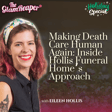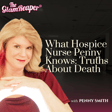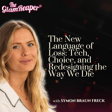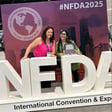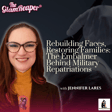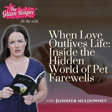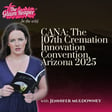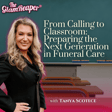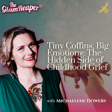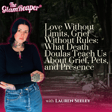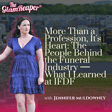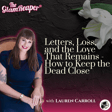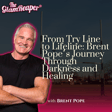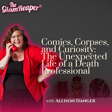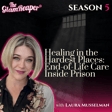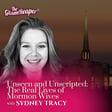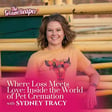
Healing Through Harmony: How Music Holds Our Grief
What if the most powerful way to process grief... wasn't with words, but with music?
In this emotional and eye-opening episode, Jennifer sits down with violinist and music-for-healing expert Concetta, who shares her journey from wedding performer to creating personalized music ceremonies for funerals, memorials, and even hospice homes. From honoring lost loved ones to comforting families during their hardest moments, Concetta reveals how music becomes a voice when words fall short.
They talk about living funerals, pet memorials, end-of-life rituals, and how music can bring people together—even in times of pain and conflict. You'll also hear honest stories about burnout, emotional boundaries, and the quiet signs that show up when you’re truly present with grief.
Tune in to hear a powerful conversation about healing, service, and the real meaning of celebration in life and death. If you’ve ever felt the weight of loss or wondered how to support someone grieving, this episode will stay with you long after the final note.
Key Topics:
-The healing power of music in grief
-Personalizing farewells through sound
-Navigating emotional burnout as a caregiver
-Rituals for all forms of loss, not just death
-Building connection through end-of-life ceremonies
Quotes from the episode:
“Music is not simply something in the background to create a vibe. It is really there to process the feelings and the emotions”
-Concetta Abbate
“Grief and loss aren't just specific to human life loss”
-Jennifer Muldowney
Timestamp:
[00:00] Podcast Intro
[01:19] Concetta opens up about her lifelong relationship with the violin, how it led her into the deeply meaningful work of playing music at funerals, and the birth of her organization, Sound and Memory. She shares how music has become her way of helping people grieve together, honoring lives through heartfelt, personalized, and non-religious ceremonies.
[11:29] Concetta and Jennifer explore the emotional weight that music carries—whether played live or recorded—and how it can touch something deeper in moments of loss.
[19:52] They dive into how music softens tension, brings comfort to those facing anticipatory grief, and creates space for meaningful goodbyes—through personalized funerals, living celebrations, or even intimate hospice concerts at home.
[30:08] The conversation expands beyond death itself. Concetta and Jennifer talk about how grief shows up in many forms and why we need rituals to help us move through all types of loss. They also reflect on the often-unseen emotional cost of caregiving.
[40:21] They wrap with an honest look at the complexities of end-of-life work—from emotional burnout to the need for healthy boundaries and strong collaboration among professionals who support others through their most vulnerable times.
[54:02] Outro
Connect with Concetta Abbate:
LinkedIn- linkedin.com/in/concettaabbate
Instagram - @concettallegra
Website - https://www.concettaabbate.com/
Facebook - https://www.facebook.com/concetta.abbate/
Connect with Jennifer/The Glam Reaper on socials at:
Instagram - https://www.instagram.com/jennifermuldowney/
TikTok - https://www.tiktok.com/@therealglamreaper
YouTube - https://www.youtube.com/@TheGlamReaperMuldowney
LinkedIn - https://www.linkedin.com/in/jennifermuldowney/
Facebook Page - https://www.facebook.com/MuldowneyMemorials/
Email us - glamreaperpodcast@gmail.com
Shop Merch - https://the-glam-reaper.printify.me/products
Listen to The Glam Reaper Podcast on Apple Podcasts:
https://podcasts.apple.com/us/podcast/the-glam-reaper-podcast/id1572382989?i=1000525524145
The Glam Reaper® AMAZON Storefront - https://amzn.to/4hObpOh
